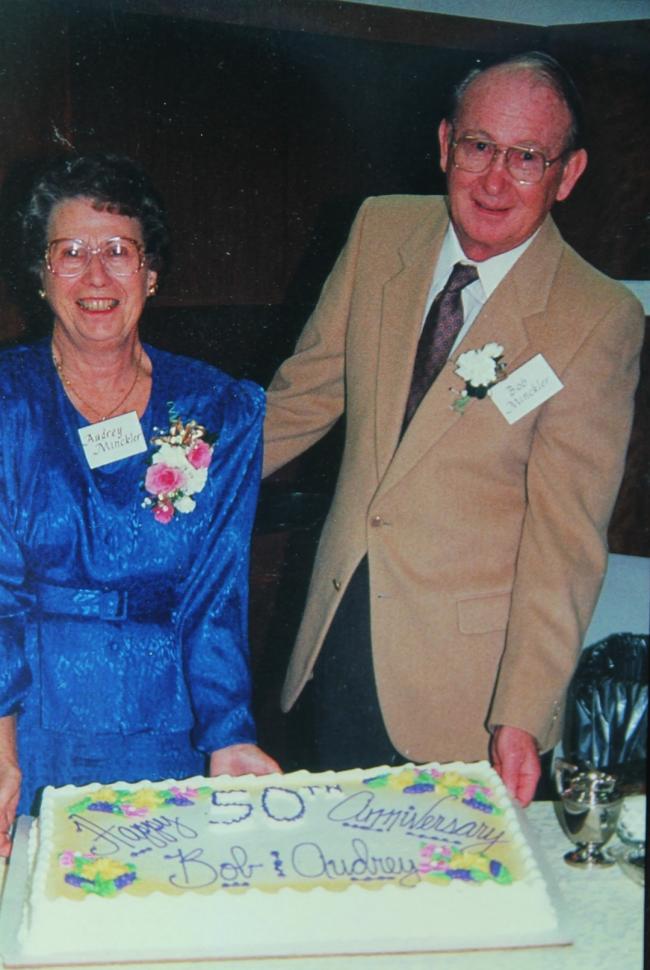An Untold Life: Bob Minckler
Bob Minckler and Audrey celebrating their 50th anniversary.
Sun, 06/02/2013
By Maggie Nicholson
The man and the boy sailed over the water, lemon-yellow under the sun’s gaze. Beneath their boat, fish droned in circles. The man knew that soon they would catch a fish. The boy knew that the fish would be good to eat. When they returned home, they would cook and eat the fish together in their small kitchen.
The man, Dilbert, turned to the boy, Bob and grinned. Dilbert was Bob’s father. Dilbert was a fisherman by pleasure and a policeman by trade, stationed within West Seattle. He was married to his loving wife Bertha, who raised Bob and took care of their home.
Bob Minckler was born and raised in West Seattle. The only child of his parents, he was talkative even as a boy. He played on his local baseball team as a pitcher and hunted occasionally with his beloved dog, Jack. He passionately studied art. In high school, he lived across the street from Audrey Gessner. Both Bob and Audrey’s homes were small and wooden. Grass sloped up to Bob’s front door, and Audrey’s backyard was filled with fruit trees.
They met when they were sixteen, as all neighborhood kids met: playing in the street. The neighborhood boys played ball games. Audrey roller-skated through the streets on old-fashioned four-wheel blades. Bob and Audrey fell in love and married when they were twenty, on March 21st, 1942, at Audrey’s childhood home. At the time, Audrey was attending the University of Washington, and the minister of her school performed the living room service.
The sky was full of light. Bob and Audrey took a water ferry to Victoria, where they stayed at The Empress Hotel for their honeymoon.
Bob was drafted into the war less than a year after the two were married. He worked on floats, taking captains and crews out to supply ships. He had learned about boats from his father early in life, on their fishing trips. He trained in New York for medical emergencies and served as a Merchant Marine, acting also as purser for the ship. During his time in service, a boat he was aboard was hit by a kamikaze. There were no fatalities. Bob treated the injured until they were able to make it safely back to shore. He was shaken.
Bob and Audrey wrote ink letters back and forth during Bob’s time at war. They had secret codes that allowed Audrey an idea where Bob was. “How is Uncle Camille?” for instance, had secret meaning. At one point, the men at sea ran out of all food but canned Spam. The chef on the ship, Bob said, was marvelous and thought of a million things to do with Spam. In the end though, Bob said, it was still Spam.
Later in life, Audrey and Bob purchased a time-share in Hawaii. Incidentally Hawaiians love Spam, and it was found feverishly throughout the island. Audrey stayed away from it in grocery stores.
Bob, before leaving for war, had left West Seattle only for California. He told Audrey he was most excited to use a vending machine. That, at the time, was his idea of something new.
After Bob returned home, he and Audrey bought a one-bedroom house on Brandon Street, near to their childhood homes. Later they purchased a plot of land farther down the road. The lot was on a hill overlooking green shores. The plot of land ascended with the foundations of an old home. As a child, Bob and his friends had scavenged within the mossy walls, using the decrepit house as a play fort. Bob designed their new house atop the ruins.
Bob worked as a dispatcher and salesman for Nelson Trucking and Reliable Transfer. He was a talented salesman and carried amicability throughout his personal life.
Bob had two daughters and one son: Barbara in 1948, Mark in 1953 and Betty in 1959. The couple was friendly with a collection of couples that called themselves the Dolly Girls and Jolly Boys. When the kids were little, they slept in one of the home’s beds as the adults played poker in the living room and conversed on sofas. Bob designed a summer cabin on Anderson Island. Bob and Audrey, along with another couple, took the ferry to the island for vacations. They golfed at the local course, under the warm sun. It was uncrowded there, and intimate. Bob had a deep laugh and a great sense of humor.
The family belonged to the Admiral Congregational Church, where their children attended preschool and Sunday school. All three of the children worked alongside Bob at the transfer company: Mark in the trucks, and Betty and Barbara in the office. Mark is now a dispatcher and salesman for Alaska Marine Lines. Barbara retired recently after working for the city of Des Moines, and Betty teaches special education.
Bob was, in his free time, a painter. His art was vividly colored and organic. One painting depicts the famous “haunted house” of Georgetown: Audrey’s grandparents’ old home. When Bob passed away in 2012, his children collected their favorite paintings, to hang and keep close.
On Bob and Audrey's 50th anniversary they were offered a free stay by their honeymoon hotel, The Empress. Older then, and still very much in love, they boarded the familiar water ferry. With hands entwined and hearts impressed with the memories of their shared past, they went together unafraid into the sloping green hills of Victoria.




